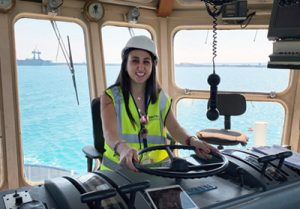
The International Maritime Organization’s Maritime Council has established an International Day for Women in Maritime, which is to be observed each year on May 18.
Adopted by the IMO Assembly in December 2021, the observance would celebrate women in the industry, promote the recruitment, retention and sustained employment of women in the maritime sector, raise the profile of women in maritime, strengthen IMO’s commitment to gender equality and support work to address the current gender imbalance in maritime.
The proposal to establish an International Day for Women in Maritime was first addressed by IMO’s Technical Cooperation Committee (TCC) in September 2021 following the momentum of the World Maritime Theme in 2019: empowering women in the maritime community. The proposal received wide support from the Committee in forwarding the proposal to the Council.
“I welcome the Council’s adoption of this proposal,” IMO Secretary-General Kitack Lim said in a statement. “Not only does it further efforts to achieve … gender equality, but it is a perfect follow-on action to the IMO Assembly’s resolution and call to achieve a barrier-free environment for women, so that all women can participate fully, safely and without hindrance in the activities of the maritime community, including seafaring and shipbuilding.”
Women currently represent only 1.2% of the global seafarer workforce, according to the BIMCO/ICS 2021 Seafarer Workforce Report. Although tiny, the amount actually represents a positive trend in gender balance, with the report estimating 24,059 women serving as seafarers, a 45.8% increase compared with the 2015 report.
Within the historically male-dominated maritime industry, IMO says that it has been making a concerted effort “to help the industry move forward and support women to achieve a representation that is in keeping with twenty-first century expectations.”
The IMO’s Women in Maritime Program was launched in 1988 at a time when only a few maritime training institutes opened their doors to female students. Since then, IMO’s gender and capacity-building program has helped put in place an institutional framework to incorporate a gender dimension into IMO’s policies and procedures.
“There is ample evidence that investing in women is the most effective way to lift communities, companies and even countries,” the IMO said in a statement. “The evidence is clear: equality for women means progress for all.”
